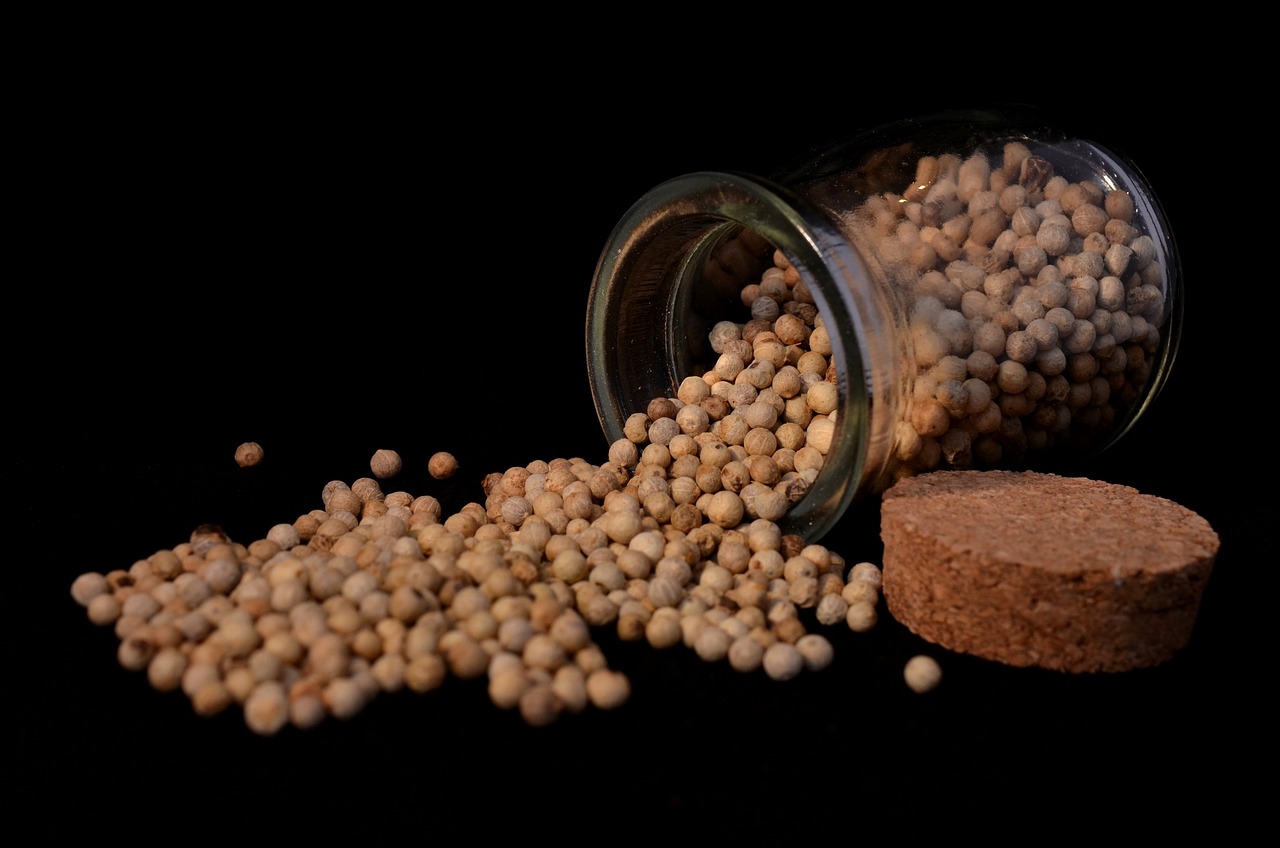Black pepper, known as the "king of spices," is a common household seasoning globally. The distinct flavor of black pepper is due to the presence of piperine, a compound responsible for the many potential health benefits associated with this spice. Some individuals choose to take piperine supplements, such as BioPerine, to increase their piperine intake. But what is BioPerine, and why is it gaining popularity in the world of health and wellness? This comprehensive guide will answer these questions, delve into the benefits of BioPerine, and provide insight into its safety and dosage.
So, what is Bioperine exactly?
Bioperine is a patented extract obtained from black pepper fruits (Piper nigrum) and is standardized to contain at least 95% piperine [1]. Piperine is an alkaloid responsible for the pungency of black pepper and has been found to have numerous health-promoting effects. Bioperine has gained significant attention in recent years due to its ability to enhance the bioavailability of various nutrients and pharmaceuticals by inhibiting certain enzymes responsible for drug metabolism [2]. In this comprehensive review, we will discuss the potential health benefits, mechanisms of action, and applications of Bioperine in the context of improving nutrient absorption and addressing drug resistance in cancer treatment.
Piperine: The Active Compound in BioPerine
Piperine is an alkaloid that is chiefly responsible for the characteristic sharp flavor and aroma of black pepper, scientifically known as Piper nigrum. This bioactive compound has been the subject of extensive scientific research due to its myriad potential health benefits. These benefits encompass a wide array of effects, including anti-inflammatory, antioxidant, and cognitive-enhancing properties. By presenting piperine in a concentrated and highly absorbable format, BioPerine aims to deliver these health benefits in supplement form. However, while the potential benefits of piperine are promising, more rigorous and comprehensive human studies are required to fully establish its effectiveness and safety.
What Are The Main Benefits of Bioperine
Bioperine and Nutrient Absorption
1.1 Enhanced Bioavailability of Carotenoids
A recent clinical trial investigated the effect of black pepper on the absorption of carotenoids, a class of essential nutrients found in vegetables. [3] The study aimed to determine whether consuming black pepper with vegetables increased the bioavailability of carotenoids such as beta-carotene. The trial involved multiple interventions, including the consumption of vegetable salads with various dressings and the addition of black pepper.
The results of the study demonstrated that black pepper, which contains Bioperine, has the potential to increase the absorption of carotenoids in the body. This finding suggests that incorporating black pepper in the diet may enhance the nutritional value of vegetables by improving the body's ability to absorb essential nutrients.
There have also been several studies of piperine as a supplement to this effect, with the extract showing improved absorption rates when taken alongside vitamin and mineral pills. It has also been shown to be particularly effective at increasing absorption of certain plant extracts, such as curcumin and gingerols.
1.2 Inhibition of Drug-Metabolizing Enzymes
The primary mechanism behind Bioperine's ability to enhance nutrient absorption is its inhibitory effect on drug-metabolizing enzymes, such as cytochrome P450 and P-glycoprotein [2]. These enzymes are found in the gastrointestinal mucosa and play a critical role in the first-pass metabolism of nutraceuticals and pharmaceuticals. By inhibiting these enzymes, Bioperine allows for increased levels of nutrients in the bloodstream [4].
It is essential to note that most studies investigating the effects of Bioperine on nutrient absorption have utilized purified sources of piperine and nutraceuticals. While these studies provide valuable insights, they may not directly translate to the use of black pepper as a spice in real food applications.
2. Bioperine and Drug Resistance in Cancer Treatment
2.1 Challenges in Traditional Cancer Therapies
The evolving dynamics of drug resistance due to tumor heterogeneity often creates impediments to traditional therapies, making it a challenging issue for cancer cure [5] . Breast cancer, in particular, faces challenges of current therapeutic interventions owing to its multiple complexities and high drug resistivity, for example against drugs like trastuzumab and tamoxifen [6].
Drug resistance in the majority of breast cancer is often aided by the overtly expressed P-glycoprotein (P-gp) that guides in the rapid drug efflux of chemotherapy drugs [7]. Despite continuous endeavors and groundbreaking achievements in the pursuit of finding better cancer therapeutic avenues, drug resistance remains a significant obstacle. Initial research suggests that it could have some help in assisting existing treatment as it can enhance absorption, but it's stand alone benefits are not likely to be particularly useful.
2.2 Bioperine as a Potential Solution for Drug Resistance
Among newer therapeutic approaches, the application of phytonutrients such as alkaloids to suppress P-gp activity in drug-resistant cancers has found an exciting niche in the field of alternative cancer therapies [8].
A recent study presented a Bioperine-loaded chitosan (CS)-polyethylene glycol (PEG) coated polylactic acid (PLA) hybrid polymeric nanoparticle to improve the bioavailability of Bioperine and its therapeutic efficacy in suppressing P-gp expression in the MDA-MB 453 breast cancer cell line [9]. The study found that the CS-PEG-Bioperine-PLA nanoparticles demonstrated a smooth spherical morphology with an average size of 316 nm, improved aqueous solubility, and provided sustained Bioperine release. The nanoparticles also enhanced in vitro cytotoxicity and downregulation of P-gp expression in MDA-MB 453 cells compared to the commercial inhibitor verapamil hydrochloride [10].
These findings suggest that the development of a Bioperine-based nano-drug delivery system in combination with traditional therapies could be a potentially effective approach to tackling multi-drug resistance in cancers.
3. Other Potential Health Benefits of Bioperine
Aside from its role in enhancing nutrient absorption and addressing drug resistance in cancer treatment, Bioperine has been found to possess various health benefits. Some of these potential benefits include:
3.1 Anti-Inflammatory Properties
Bioperine has been shown to exhibit anti-inflammatory properties by inhibiting the production of pro-inflammatory cytokines, such as tumor necrosis factor-alpha (TNF-α) and interleukin-6 (IL-6) [11]. This suggests that Bioperine may help alleviate inflammation and reduce the risk of chronic diseases associated with inflammation, such as heart disease and arthritis. Although bioperine helps decrease inflammation, it's use in health supplements of this kind is more useful in that it helps absorption rates of several nutrients contained in curcumin or turmeric supplements which have far more powerful anti inflammatory properties and have notable absorption issues.
3.2 Antioxidant Effects
Piperine, the primary bioactive compound in Bioperine, has demonstrated antioxidant properties in various studies [12]. Antioxidants help protect cells from damage caused by free radicals, which can lead to oxidative stress and contribute to the development of chronic diseases such as cancer and heart disease.
3.3 Potential Weight Loss Aid
Some studies suggest that Bioperine may help support weight loss by increasing thermogenesis, the process by which the body generates heat and burns calories [13]. By enhancing thermogenesis, Bioperine may help boost metabolism and promote weight loss when combined with a healthy diet and exercise program. It has also been shown to increase the absorption of other thermogenic supplements such as Capsaicin.
Furthermore, piperine appears to impede the formation of new adipocytes, or fat cells, which could play a crucial role in preventing weight gain. This mechanism could be particularly beneficial for those aiming to maintain their weight or those on a weight loss journey. However, these findings mainly come from animal studies, and further research is necessary to ascertain how BioPerine, a supplement containing piperine, might affect weight management in humans.
Although, despite this early interest in the black pepper extract as a weight loss aid, it seems that it's use as a dietary supplement for this purpose is likely to be limited at best with most studies showing it's impact to be relatively minimal.
Dosage And Potential Bioperine Side Effects
Taking Bioperine is generally considered safe and well-tolerated when consumed in moderate amounts. However, excessive consumption of black pepper or Bioperine supplements may cause gastrointestinal irritation and other bioperine side effects [14] . It is crucial to consult a healthcare professional before starting any supplement regimen, especially if you have a pre-existing medical condition or are taking medications that may interact with Bioperine.
The optimal dosage of Bioperine for enhancing nutrient absorption and addressing drug resistance in cancer treatment remains to be determined through further research. However, most studies and supplement manufacturers recommend a dosage of 5-15 mg of Bioperine per day for general health purposes [15] . Many supplements that have poor bioavailability use 10mg as this is the most commonly tested dosage of the black pepper extract.
What Is Bioperine Conclusion
Bioperine, a patented extract obtained from black pepper fruits, has gained significant attention for its ability to enhance nutrient absorption and address drug resistance in cancer treatment. Its mechanisms of action involve inhibiting drug-metabolizing enzymes and suppressing P-gp expression in drug-resistant cancer cells. In addition to its role in nutrient absorption and cancer treatment, Bioperine possesses potential health benefits such as anti-inflammatory, antioxidant, and weight loss properties.
It is essential to consult a healthcare professional before starting any supplement regimen, especially with Bioperine, as it may interact with medications or cause side effects in excessive amounts. Further research is needed to establish the optimal dosage of Bioperine for various health applications and to better understand its potential in real food applications.
References
1 - https://www.ncbi.nlm.nih.gov/pmc/articles/PMC3634921/
2 - https://www.ncbi.nlm.nih.gov/pmc/articles/PMC4482822/
3 - https://clinicaltrials.gov/ct2/show/NCT03490955
4 - https://www.ncbi.nlm.nih.gov/pmc/articles/PMC3897003/
5 - https://www.ncbi.nlm.nih.gov/pmc/articles/PMC4854084/
6 - https://www.ncbi.nlm.nih.gov/pmc/articles/PMC4629407/
7 - https://www.ncbi.nlm.nih.gov/pmc/articles/PMC4854084/
8 - https://www.ncbi.nlm.nih.gov/pmc/articles/PMC4629407/
9 - https://www.ncbi.nlm.nih.gov/pmc/articles/PMC6022424/
10 - https://www.ncbi.nlm.nih.gov/pmc/articles/PMC6022424/
11 - https://www.ncbi.nlm.nih.gov/pmc/articles/PMC3151142/
12 - https://www.ncbi.nlm.nih.gov/pmc/articles/PMC3634921/
13 - https://www.ncbi.nlm.nih.gov/pmc/articles/PMC5426284/
14 - https://www.ncbi.nlm.nih.gov/pmc/articles/PMC3634921/
15 - https://www.ncbi.nlm.nih.gov/pmc/articles/PMC4482822/




